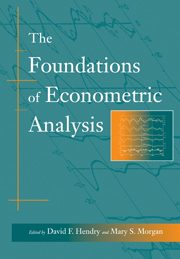Book contents
- Frontmatter
- Contents
- Preface
- Acknowledgements
- Introduction
- Bibliography
- I The Emerging Role of Econometrics in Economics
- II Early Time-Series Analysis
- 6 On the Study of Periodic Commercial Fluctuations (Read to the British Association in 1862, and in Investigations in Currency and Finance, Macmillan, 1884, pp. 3–10 and plates)
- 7 Correlation of the Marriage-Rate with Trade (Journal of the Royal Statistical Society, vol. 64, 1901, pp. 485–92)
- 8 The Correlation of Economic Statistics (Journal of the American Statistical Association, vol. 12, 1910, pp. 289–94, 306–17 (cut))
- 9 Why do we sometimes get Nonsense Correlations between Time-Series? (Journal of the Royal Statistical Society, vol. 89, 1926, pp. 2–9, 30–41)
- 10 On a Method of Investigating Periodicities in Disturbed Series, with Special Reference to Wolfer's Sunspot Numbers (Philosophical Transactions of the Royal Society of London, A, vol. 226, 1927, pp. 267–73)
- 11 A Random-Difference Series for Use in the Analysis of Time Series (Journal of the American Statistical Association, vol. 29,934, pp. 11–24 (data cut))
- 12 Calculation and Elimination of Seasonal Fluctuations [Berechnung und Ausschaltung von Saisonschwankungen] (Julius Springer, Vienna, 1936, chap. 1)
- 13 Morgenstern on the Methodology of Economic Forecasting (Journal of Political Economy, vol. 37, 1929, pp. 312–17, 320–3, 326–37 (cut))
- III Applied Econometrics and the Identification Problem
- IV The Evolution of Statistical Thinking in Econometrics
- V Dynamic Models
- VI The Tinbergen Debate
- VII Structure and Simultaneity
- VIII The Probabilistic Revolution
- IX Exogeneity
- Index
6 - On the Study of Periodic Commercial Fluctuations (Read to the British Association in 1862, and in Investigations in Currency and Finance, Macmillan, 1884, pp. 3–10 and plates)
Published online by Cambridge University Press: 05 June 2012
- Frontmatter
- Contents
- Preface
- Acknowledgements
- Introduction
- Bibliography
- I The Emerging Role of Econometrics in Economics
- II Early Time-Series Analysis
- 6 On the Study of Periodic Commercial Fluctuations (Read to the British Association in 1862, and in Investigations in Currency and Finance, Macmillan, 1884, pp. 3–10 and plates)
- 7 Correlation of the Marriage-Rate with Trade (Journal of the Royal Statistical Society, vol. 64, 1901, pp. 485–92)
- 8 The Correlation of Economic Statistics (Journal of the American Statistical Association, vol. 12, 1910, pp. 289–94, 306–17 (cut))
- 9 Why do we sometimes get Nonsense Correlations between Time-Series? (Journal of the Royal Statistical Society, vol. 89, 1926, pp. 2–9, 30–41)
- 10 On a Method of Investigating Periodicities in Disturbed Series, with Special Reference to Wolfer's Sunspot Numbers (Philosophical Transactions of the Royal Society of London, A, vol. 226, 1927, pp. 267–73)
- 11 A Random-Difference Series for Use in the Analysis of Time Series (Journal of the American Statistical Association, vol. 29,934, pp. 11–24 (data cut))
- 12 Calculation and Elimination of Seasonal Fluctuations [Berechnung und Ausschaltung von Saisonschwankungen] (Julius Springer, Vienna, 1936, chap. 1)
- 13 Morgenstern on the Methodology of Economic Forecasting (Journal of Political Economy, vol. 37, 1929, pp. 312–17, 320–3, 326–37 (cut))
- III Applied Econometrics and the Identification Problem
- IV The Evolution of Statistical Thinking in Econometrics
- V Dynamic Models
- VI The Tinbergen Debate
- VII Structure and Simultaneity
- VIII The Probabilistic Revolution
- IX Exogeneity
- Index
Summary
1 In the daily market reports, and other statistical publications, we continually find comparisons between numbers referring to the week, month, or other parts of the year, and those for the corresponding parts of a previous year. The comparison is given this way in order to avoid any variation dueto the time of year. And it is obvious to everyone that this precaution is necessary. Every branch of industry and commerce must be affected more or less by the revolution of the seasons, and we must allow for what is due to this cause before we can learn what is due to other causes.
2 Merchants and manufacturers are of necessity intimately acquainted, by experience or by tradition, with such periodic fluctuations as occur in their own branches of industry. By the skill and rule-of-thumb knowledge which each one acquires in his own pursuits, they make allowance for such variations, and thus very rude comparisons of prices, stocks, and sales enable them to detect irregular changes in their own market, which is all that they require.
3 But the unwritten knowledge of commercial fluctuations is not available for scientific purposes, and it is always of very limited extent; so that, if we come to inquire into the causes of more obscure fluctuations, such as those of credit, bankruptcy, bullion, currency, rate of interest, etc. theorists and practical men alike disagree.
- Type
- Chapter
- Information
- The Foundations of Econometric Analysis , pp. 113 - 121Publisher: Cambridge University PressPrint publication year: 1995
- 1
- Cited by



